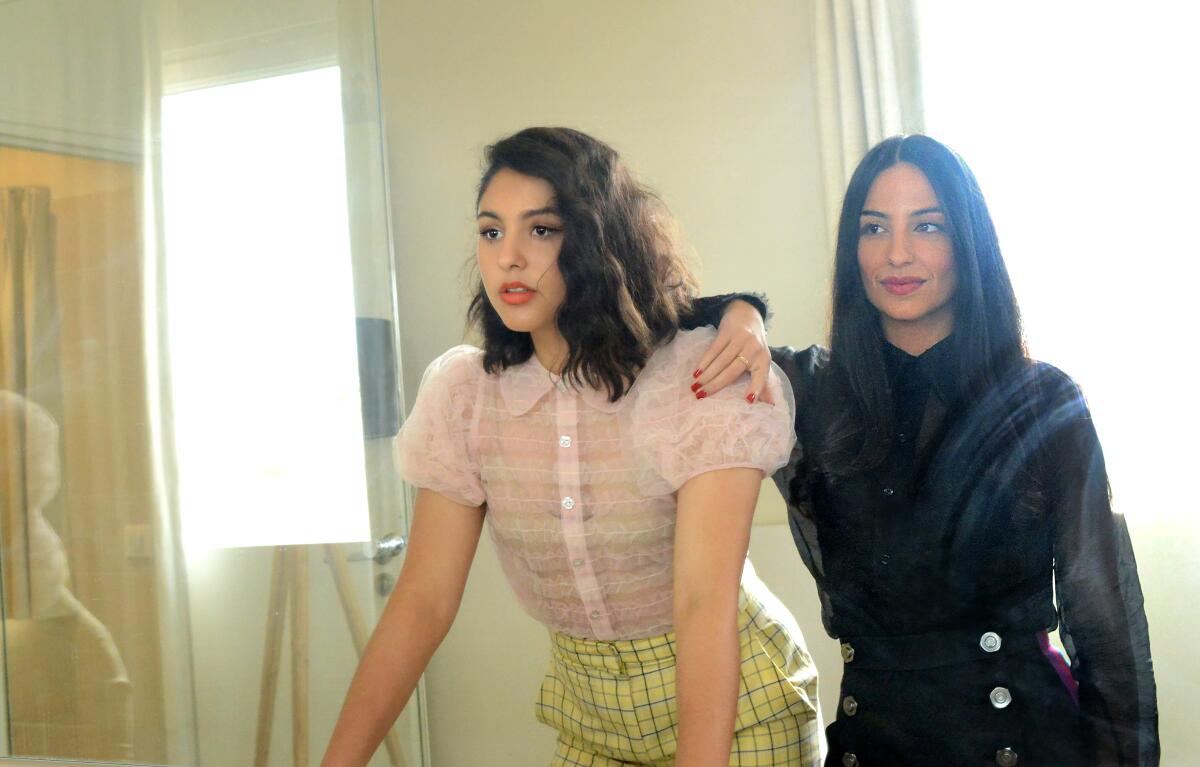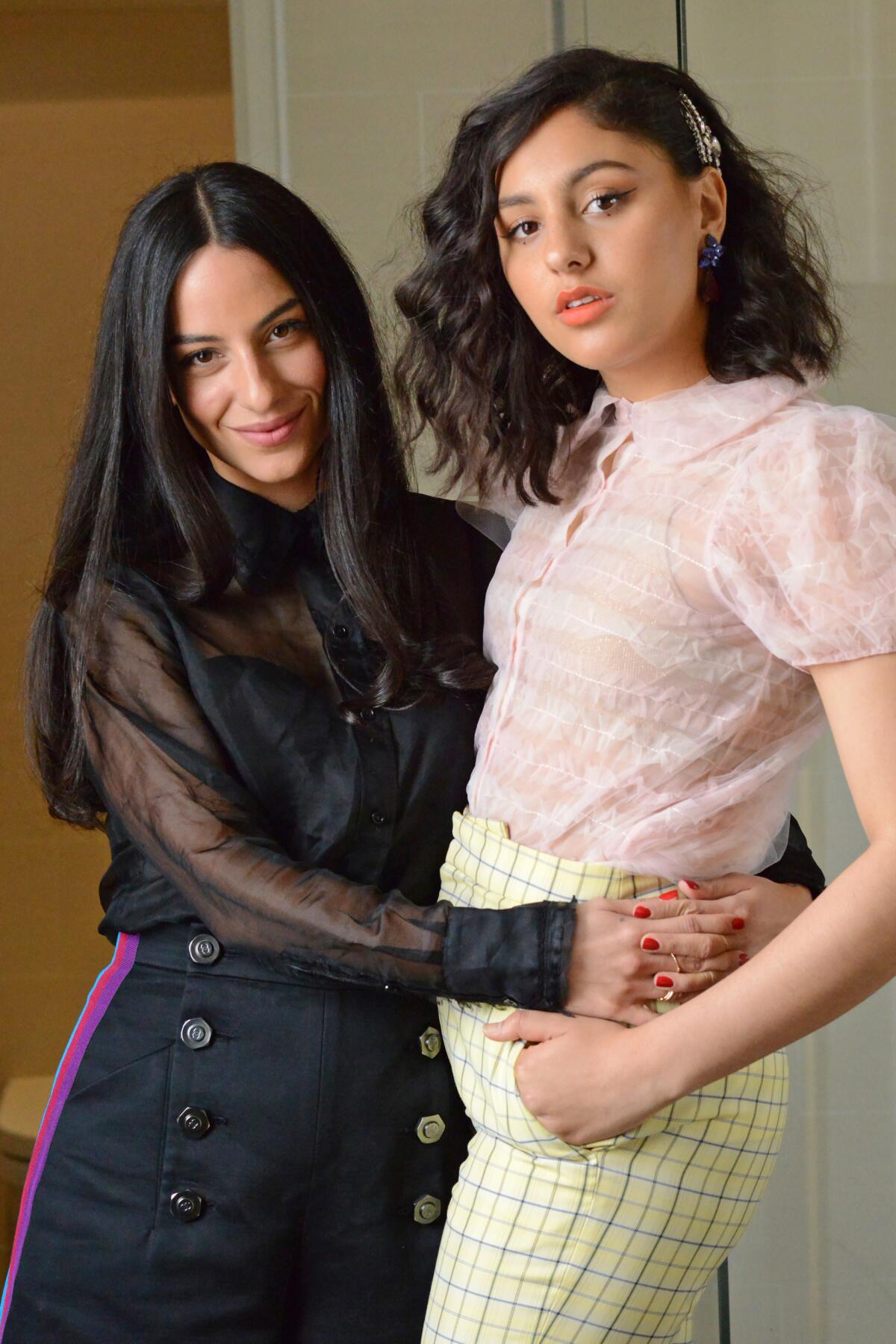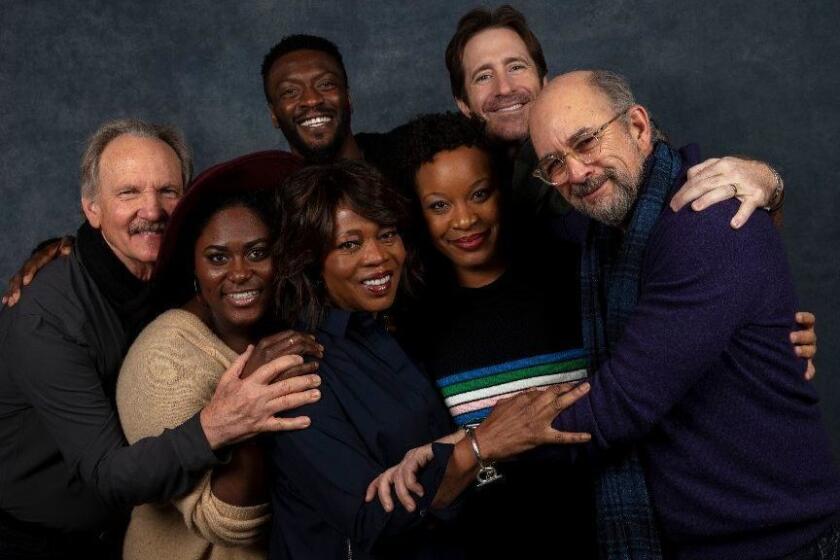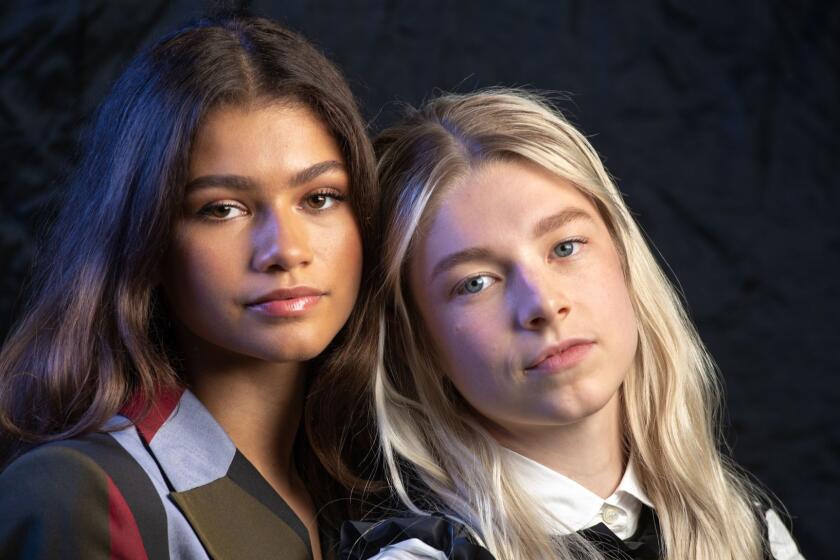Star of HBO’s ‘Share’ on being detained at airport: ‘It’s the most unjust feeling’

- Share via
After auditioning 500 young women to star in her directorial debut, Pippa Bianco had finally found the girl she wanted to play her lead. The exhaustive search had taken months and led her overseas, where she’d tracked down a fresh-faced British teenager named Rhianne Barreto.
But when it came time to fly Barreto to New York to begin shooting “Share” — which already had support from the Sundance Institute and production company A24 — the actress was denied a work visa. Though there was no official reason given for the rejection, Barreto assumed it had to do with the color of her skin. Her father is Iraqi, and embassy officials asked if she spoke Arabic.
Despite three appeals, the last of which was supported by letters from Sens. Chuck Schumer, Kirsten Gillibrand and Elizabeth Warren, the ruling never changed. But Bianco felt so adamant about Barreto playing the role that she found a way to move filming to Toronto, where the actress was granted permission to work.
The effort paid off: The movie premiered at the Sundance Film Festival in January, where Bianco was awarded a screenwriting prize and Bareto was given a special jury award for her performance. HBO acquired “Share” out of the festival in a reported seven-figure deal, and will premiere the movie Saturday.
This year’s Sundance Film Festival was not just inclusive in its selections, but in its awards as well.
In the movie, Barreto plays Mandy, who in the opening scene of the film wakes up on her front lawn with little to no memory of what transpired at a party the night before. She soon learns that her classmates are circulating a video of her from that night that shows she may have been the victim of sexual misconduct.
While Barreto is excited to promote the project — it’s the biggest thing she’s done since starring in the Amazon Prime thriller “Hanna” — she’s still facing travel issues. Last week, after flying from the U.K. to New York for press, she was detained by airport authorities for hours. The actress, now 21, and Bianco spoke to The Times the morning after that incident.
How are you doing, Rhianne? What happened at the airport?
Barreto: So I went to customs, go to the normal kiosk, and he’s just like, “When are you leaving?” Normal questions. Then he tells me the computer isn’t working, so I’m going to have to follow his colleague. I’m like, ‘[Crap], this is where they take people to get interviewed.’ It’s just this room full of majority brown people. No phones allowed. It was scary. No one has known whether or not I’ve landed or got through immigration, and I can’t communicate with anyone.
And I’m seeing there are people who’ve come in after me who are going ahead of me. They tell me that U.S. citizens and minors get to go ahead, but I definitely saw a white, British man come in later than me and go up to the podium much earlier than me. So I just started crying. It was this weird feeling of: I’m back where I started. I was so jet-lagged and so tired. About an hour and a half into the wait, they told me it would take minimum another hour. A girl sitting next to me saw me crying and said, “We all have to wait.” Yeah, we all have to wait, but it felt like PTSD. I was on the verge of a panic attack, completely alone. I thought this was all over, and it wasn’t. And then, after two and a half hours, they called my name. I was crying and had to wipe my tears away. He was like, “When are you leaving?” I told him, and he let me go. It was so weird and so unnecessary.
What was going through your mind while you were sitting there waiting?
Barreto: I sat there thinking: This is the weirdest thing, because my whole life, I’ve never really experienced racism. I’m British. I’m so British — it’s in my bones. It’s the most unjust feeling, and I can’t deal with injustice. And I’m in such a good position! Because I knew I had a lawyer and producers. If you had no money and are trying to get here safely, it’d be such an isolating feeling. Before getting “Share,” none of my life had I been thinking that the color of my skin was a problem.
Did you channel some of those emotions into your performance in “Share?”
Barreto: As an actor, it was quite useful. I’d never been that out of control. I just completely felt powerless, and I’d done nothing wrong. My mom and dad and producers and lawyers were telling me what to do. It was very similar to Mandy’s experience. I don’t know if it’s art imitating life or looking for a yellow car and seeing them everywhere — but I was so emotionally ready at that point. Pippa offered me the job and I remember sitting in my shower thinking, “I’m not ready. I’ve never been in a film before. I can’t do this.” ... I had this emotional palate now I didn’t know I had. That pain had to be useful for something, and it was this film.
Pippa, after seeing so many American actresses try out for Mandy’s part, your casting director suggested you look overseas for the role. Why?
Bianco: We had a seen a lot of tapes of American girls, and I wanted to cast an American because I wanted complete authenticity. But I felt I was getting a very similar performance across the board. And Avy [Kaufman, the casting director] was like, for the kind of minimalism and dignity and restraint you want, you’re going to have better luck outside of the U.S. In the U.S., the star system and currency is fame. So I feel like it’s not enough to be a young actor — you’re also a singer, an Instagram influencer, a dancer, a model. You’re expected to perform so many ways as a professional young actress in the U.S. Whereas in the U.K. or Australia... the craft is more theater-based, rather than fame- or star-power-centric.

This film is based on your 2015 short of the same name, which was made before the #MeToo movement took hold. What drove you to explore issues of sexual consent?
Bianco: Voyeurism is something I think about constantly. What are the ethics or utility of consuming images of violence or other people’s pain? And a lot of my favorite films interrogate the way in which cinema is inherently voyeuristic. But there’s always an emotional and psychological place as well, and I did know a couple of people [involved in similar situations]. So if I knew someone who made a video like this — and that’s someone who is close with his mother, one of his best friends is a girl — if it’s that easy for this person to dehumanize somebody, what is it about looking at somebody through a camera that allows someone to do that to another? It’s not always someone who is malicious and cruel. By and large, people are hurt by people who love them and care about them. That was something that haunted me. If this happens as often as it does between people who love each other, why?
Do you see this as a project that is in conversation with the #MeToo movement?
Bianco: When I made the short, I did feel the climate was different — people were like, “Do things like this really happen? This strains credibility. This is kind of outlandish and niche.” Unfortunately and fortunately, it was much more accessible to people when we made the film because that’s obviously not the climate now. The way that it’s in conversation with this moment now, because so many people are coming forward — for all the ones who do not, there is decreased empathy. There’s the assumption that it’s easy to do and cost-free, and if you listen to what Christine Blasey Ford is going through — it’s never cost-free. There is so much that’s imposed upon you, as much as you assert free will in that process.
But I think we talk a lot more in these interviews in issues of politics than we did in the making of the film, in some ways. At its heart, stories about young women, especially, are either trivialized or made into broccoli. “We have to see this because it’s politically correct to talk about and women are important now.” This is the story of a young person navigating what it’s like to be powerless in the world. I was making a statement about gender politics by making a film about a young female. I find those conversations exhausting, in some ways. I think we’re both obviously deeply invested in humanizing, dignifying, empowering other women of color. So I definitely stand with those movements, even if I don’t think of the film as an issues movie.
“Nobody is getting their head cut off,” Zendaya says.
Pippa, you recently directed an episode of HBO’s “Euphoria,” which is also about how difficult it can be to be a young person today. What have you observed about teenagers after making these projects?
Bianco: When I was a teenager, I didn’t feel any less fully realized. The scale of my emotion wasn’t any different than it was now. Just because you’re a younger person, it doesn’t mean your inner life isn’t as developed. As an older person, the tendency is to look back and trivialize it because you’ve lived through it. It’s really tempting to dismiss the pain you were in as a younger person. But it’s the first time you’ve experienced anything. You don’t know whether you’re gonna make it, so the scale of emotion is really profound and deserves that kind of dignity and gravitas.
How do you think social media has affected the way high school students treat one another?
Bianco: In my mind, the film isn’t about the evils of social media. Very little of it has to do with the medium. In many ways, I think social media has opened things up for the better. My youngest sibling was growing up in a small town in Long Island, and she’s a fascinating weirdo. She can be on Reddit and gaming platforms and communicate through forums — things she wouldn’t be able to find locally. I think having your world opened up like that is an unparalleled gift.
Barreto: I have nine siblings, and they’re all younger than me except for one, so they’re all basically in high school. I can see that my sisters are so much more politically aware. Instagram and Twitter can be a great source of news. My little sisters can tell you what the conservative manifesto is and what party they align, whereas I didn’t have that knowledge. I grew up with OCD, thinking I was the only one in the world who had it, and the internet is really useful for mental health. It’s not the same way it was when I was growing up. Anxiety isn’t a taboo subject anymore.
After all of the turmoil you’ve faced trying to work in America, do you still feel like it’s something you want to do?
Barreto: It doesn’t put me off working in America. I see Americans who look like me, and I want to represent. It makes me want to fight really hard. I don’t want to give the role to other people. I want to be in the room.
More to Read
Only good movies
Get the Indie Focus newsletter, Mark Olsen's weekly guide to the world of cinema.
You may occasionally receive promotional content from the Los Angeles Times.












